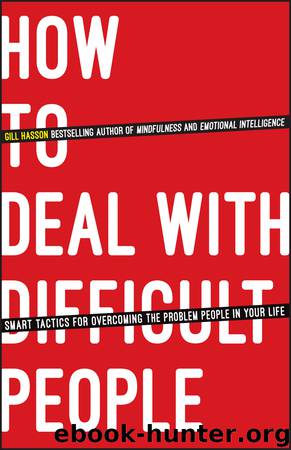How to Deal with Difficult People by Gill Hasson

Author:Gill Hasson
Language: eng
Format: epub
ISBN: 9780857085719
Publisher: Wiley
Published: 2014-12-03T00:00:00+00:00
Part Two
Putting It Into Practice
Chapter 5
Dealing With Direct Hostility
Who doesn't encounter difficult, hostile people every now and again? Whether it's someone in your family, at work or out in public, openly hostile people are confrontational, obnoxious and intimidating. An encounter with an openly hostile person can leave you feeling upset, powerless and angry.
People usually behave in this way for one of two reasons: to dominate, control and get what they want (instrumental aggression) or as a reaction, a response to something that has or hasn't happened to them (impulsive aggression).
When someone uses instrumental aggression, it's because they've learnt that by being difficult they can get whatever they want from another person. For them, their disagreeable ways – their aggression and hostility – are nothing more than a means to serve their ends. Yet, to you, their aggression is a weapon that leaves you feeling hurt, confused, perhaps even bullied.
When someone uses impulsive aggression it's usually as a result of an unmet expectation or need, and they now feel wronged or let down. Sometimes their anger may build; other times something suddenly happens which makes them angry, even enraged.
Whether someone is using instrumental aggression or is impulsively aggressive (the situations in this chapter are examples of both), it can be difficult to manage your own feelings. There are, though, ways to avoid reacting emotionally to someone else's hostility; you'll need to use listening skills and take an assertive approach.
You can choose whether to let the hostile person dictate to you what is going to be done. You can choose whether to engage. You can walk away at any point in the confrontation with a hostile person.
It's helpful to remind yourself whose problem this really is: the hostile person's, not yours. Only take responsibility for your own actions. You are not responsible for anyone else's behaviour or for the emotions someone else is feeling. You are not to blame if they choose to be angry or upset with you, someone or something else. They need to manage their own feelings and reactions.
With aggressive people you must send a clear signal that you are strong and capable – anything less is an invitation for further attacks.
You can, however, help or exacerbate the situation according to your responses.
If you step out boldly, you send out a quite different message, one of confidence.
Remember to use assertive body language; you may not be feeling very confident but you'll certainly look it. Remind yourself to use just two or three confident actions:
stand or sit straight
keep your head level
relax your shoulders
spread your weight evenly, on both legs
If sitting, keep your elbows on the arms of your chair (rather than tightly against your sides)
make appropriate eye contact
lower the pitch of your voice
speak more slowly.
Download
This site does not store any files on its server. We only index and link to content provided by other sites. Please contact the content providers to delete copyright contents if any and email us, we'll remove relevant links or contents immediately.
Tools of Titans by Timothy Ferriss(8350)
Change Your Questions, Change Your Life by Marilee Adams(7721)
Deep Work by Cal Newport(7044)
Playing to Win_ How Strategy Really Works by A.G. Lafley & Roger L. Martin(6190)
Man-made Catastrophes and Risk Information Concealment by Dmitry Chernov & Didier Sornette(5982)
Digital Minimalism by Cal Newport;(5741)
Big Magic: Creative Living Beyond Fear by Elizabeth Gilbert(5729)
The Slight Edge by Jeff Olson(5400)
Ego Is the Enemy by Ryan Holiday(5395)
The Motivation Myth by Jeff Haden(5194)
The Laws of Human Nature by Robert Greene(5139)
Stone's Rules by Roger Stone(5066)
Tuesdays with Morrie by Mitch Albom(4754)
Eat That Frog! by Brian Tracy(4502)
Rising Strong by Brene Brown(4435)
Skin in the Game by Nassim Nicholas Taleb(4225)
The Money Culture by Michael Lewis(4175)
Bullshit Jobs by David Graeber(4167)
Skin in the Game: Hidden Asymmetries in Daily Life by Nassim Nicholas Taleb(3980)
